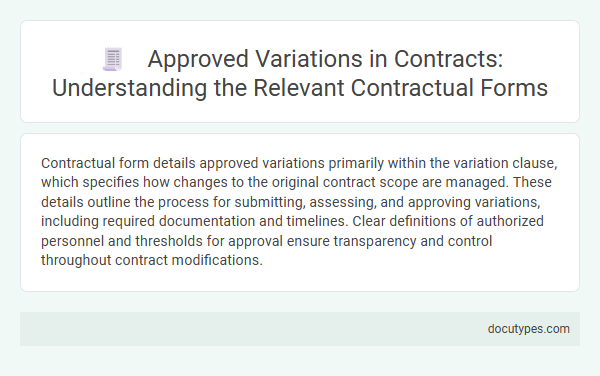Contractual form details approved variations primarily within the variation clause, which specifies how changes to the original contract scope are managed. These details outline the process for submitting, assessing, and approving variations, including required documentation and timelines. Clear definitions of authorized personnel and thresholds for approval ensure transparency and control throughout contract modifications.
Introduction to Approved Variations in Contracts
Contracts often include specific provisions to manage approved variations, ensuring clarity and agreement on changes. Understanding which contractual form details approved variations helps you navigate project modifications effectively.
- Standard Form Contracts - These contracts typically outline procedures for submitting and approving variations, maintaining control over scope changes.
- Design and Construct Contracts - They often incorporate variation clauses that specify how approved changes impact costs and timelines.
- Government Contracts - These forms emphasize strict documentation and approval processes for any variations to safeguard compliance.
Defining Variations: Scope and Importance
Contractual forms such as the NEC and FIDIC clearly outline approved variations to ensure changes are properly documented and managed. Defining variations involves specifying adjustments to the original scope, including additions, omissions, or substitutions of work. Understanding the scope and importance of these variations helps maintain project integrity and prevents disputes between parties.
Legal Framework Governing Contract Variations
The legal framework governing contract variations specifies which contractual form details approved variations. These details ensure that all changes are documented and agreed upon to maintain enforceability under the law.
Approved variations typically require written consent from all parties involved, outlining the scope and impact of the changes. Your contract should explicitly state the form and procedure for submitting and approving these variations to avoid disputes. Courts generally uphold variations that follow the agreed contractual format, reinforcing the importance of adhering to the legal framework.
Types of Approved Variations in Standard Contracts
Approved variations in contracts specify changes that have been formally accepted by all parties involved. Standard contracts outline various types of these approved variations to ensure clarity and compliance throughout the project lifecycle.
- Variation Orders - Official documents issued to modify the scope, cost, or timeline of the contract work.
- Change Requests - Proposals submitted for alterations that require approval before implementation.
- Extension of Time - Granted adjustments to the contract schedule due to unforeseen events or approved changes.
Understanding the types of approved variations ensures proper contract administration and risk management.
Formal Requirements for Documenting Variations
Formal requirements for documenting approved variations in a contract are critical to ensure clarity and enforceability. Typically, variations must be detailed in writing, specifying the scope, cost implications, and time adjustments, and signed by authorized parties. Your contract may specify particular forms or templates for these documents to maintain consistency and legal validity.
Common Contractual Forms for Approving Variations
| Contractual Form | Description | Method of Approving Variations | Key Clauses Reference |
|---|---|---|---|
| JCT (Joint Contracts Tribunal) | Standard forms widely used in UK construction projects covering building works, civil engineering, and more. | Variations must be instructed in writing by the contract administrator or architect. The contractor submits a proposal for valuation and time adjustment. | Clause 2.19 (Variations and Adjustments), Clause 4.20 (Valuation of Variations) |
| FIDIC (International Federation of Consulting Engineers) | International contracts commonly used in engineering and construction projects globally. | Engineer issues variation orders in writing. Contractor must notify any impact on price or time. Disputes resolved per contract procedures. | Clause 13 (Variations and Adjustments) |
| NEC (New Engineering Contract) | Flexibly designed contracts focusing on collaboration and clear communication for construction and engineering projects. | Variations processed as compensation events. Early notification required. Approval involves quotation review and impact assessment. | Clause 60 (Compensation Events: Variations) |
| AS 4000 (Australian Standard) | General conditions of contract used predominantly in Australian construction industry. | Variations must be instructed in writing by the superintendent. Contractor must seek approval before proceeding. Valuation based on rates and prices or fair valuation. | Clause 17 (Variations) |
| PPC2000 (Project Partnering Contract) | Collaborative contracting form used to promote partnership in project delivery. | Variation proposals submitted and agreed through partner group meetings. Written approval required before implementation. | Clause 11 (Variations) |
Procedures for Submitting and Approving Variations
Approved variations in contracts are typically detailed in formal documentation specifying the agreed procedures for changes. These procedures ensure that any alterations to the original contract are submitted, reviewed, and authorized properly.
Procedures for submitting and approving variations require clear communication and adherence to contract terms to maintain project integrity and control costs.
- Submission of Variation Requests - Variations must be documented through a formal request outlining the scope, reason, and impact on cost and schedule.
- Review Process - Contract administrators assess the submitted variation against contractual terms and project requirements before recommending approval.
- Approval and Documentation - Once approved, variations are formally recorded and integrated into the contract, ensuring legal and procedural compliance.
Impact of Approved Variations on Project Delivery
Approved variations in contractual forms such as Change Orders or Variation Orders specify adjustments to the original scope, cost, or timeline of a project. These documents ensure that all modifications are formally recognized and agreed upon by all parties involved.
Understanding which contractual form details approved variations is crucial for managing the impact on project delivery schedules and budgets. Your ability to track and implement these variations directly influences the successful completion and quality of the project.
Managing Risks Associated with Contract Variations
Contractual forms such as Lump Sum, Cost Plus, and Unit Price clearly outline the process for approving variations, specifying the necessary documentation and authorization steps. These details ensure that changes to the original contract scope are managed transparently and consistently.
Managing risks associated with contract variations involves carefully reviewing approvals to prevent scope creep and unexpected costs. You should monitor variations closely to maintain project control and protect your financial and legal interests.
Which Contractual Form Details Approved Variations? Infographic

